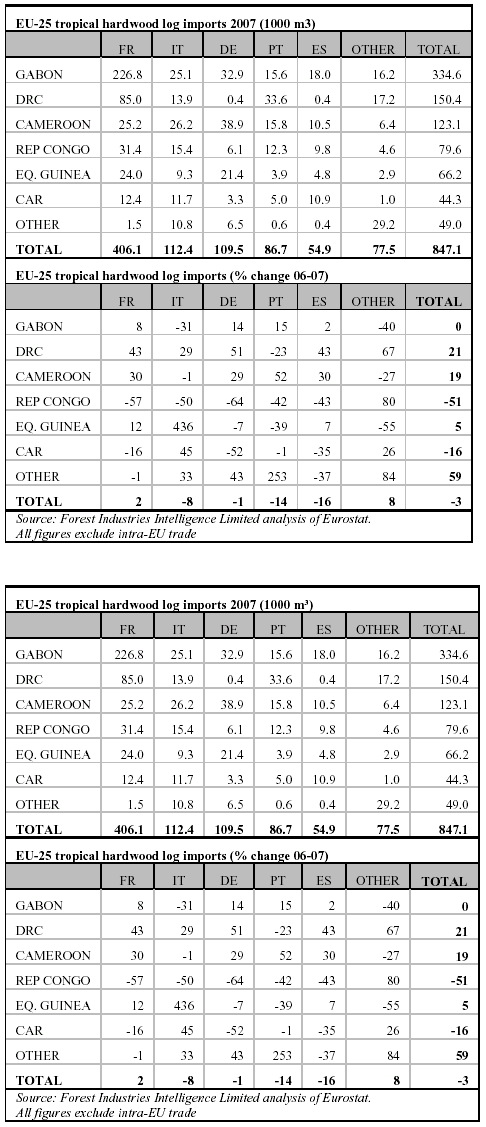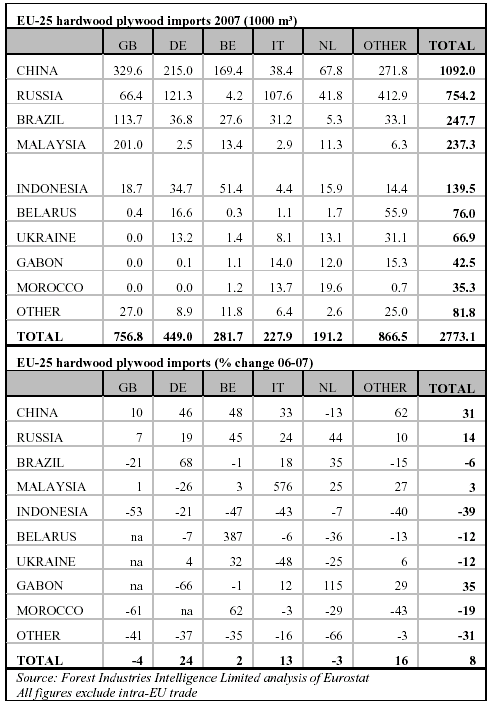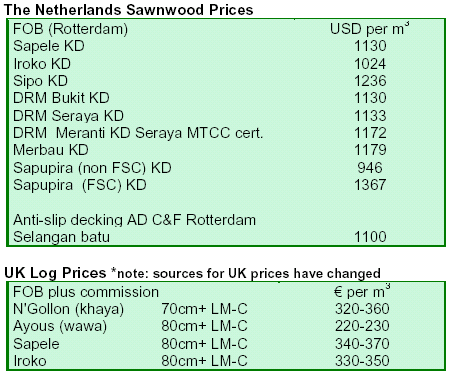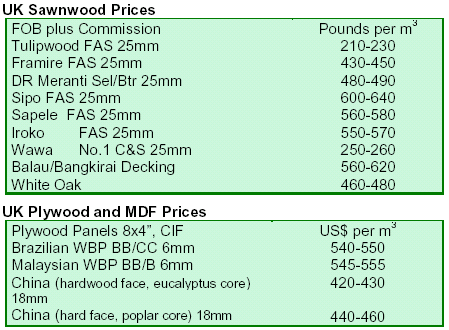|
Report
from the UK
¡¡
EU-25 import analysis 2007
An analysis of Eurostat import data for 2007 for the EU-
25 group of countries (all EU members excluding
Romania and Bulgaria) carried out by Forest Industries
Intelligence Limited reveals the following:
Tropical Hardwood Logs
EU tropical hardwood log imports during the year
reached 847,100 m3, down 3% on the previous year.
Leading EU importing countries of tropical hardwood
logs in 2007 were France (406,100 m3), Italy (112,400
m?, Germany (109,500 m3), Portugal (86,700 m3), and
Spain (54,900 m3),
Imports of tropical hardwood logs fell dramatically in
Italy (-8%), Portugal (-14%), and Spain (-16%) during
2007. However, this was partly offset by a slight
increase in imports by France (up 2%).
Leading countries supplying tropical hardwood logs to
the EU during 2007 were Gabon (334,600 m3,
Democratic Rep. of the Congo (150,400 m3, Cameroon
(123,100 m?, and the Congo (79,600 m3.)
EU imports of tropical hardwood logs from Gabon
remained stable between 2006 and 2007. Imports
increased from the Democratic Rep. of the Congo (up
21%) and Cameroon (up 19%). However there was a
significant fall in imports from the Congo (down 51%).
Tropical Hardwood Sawn
EU-25 tropical hardwood sawn imports during 2007
reached 2,314,300 m? up 4% on the previous year.
Leading EU importing countries of tropical hardwood
sawn in 2007 were the Netherlands (553,000 m3),
France (345,800 m3), Italy (335,000 m3), Spain (332,400
m3), Belgium (220,400 m3), and the UK (151,000 m3).
Imports of tropical hardwood sawn fell dramatically in
Italy (down 10%) and more moderately in Spain (down
2%) during 2007. However, this was offset by a
significant increase in imports by Netherlands (up 6%),
France (up 11%), Belgium (up 4%) and the UK (up
15%).
Leading countries supplying tropical hardwood sawn to
the EU during 2007 were Brazil (639,700 m3),
Cameroon (580,700 m3), Malaysia (345,800 m3), Cote
d¡¯Ivoire (231,700 m3), Gabon (117,700 m3), and Ghana
(82,800 m3).
EU imports of tropical hardwood sawn rose strongly
from Brazil (up 31%) and Gabon (up 13%) and more
moderately from Cameroon (up 3%) during 2007.
However there was a significant fall in imports from
Malaysia (down 26%), and a slight fall in imports from
Ghana down 6%).
Hardwood plywood
EU-25 imports of hardwood-faced plywood (both
temperate and tropical hardwood) during 2007 reached
2,773,100 m3 up 8% on the previous year.
Leading EU importing countries of hardwood plywood
in 2007 were the UK (756,800 m3), Germany (449,000
m3), Belgium (281,700 m3), Italy (227,900 m3), and the
Netherlands (191,200 m3).
Imports of hardwood plywood fell slightly to the UK
(down 4%) and the Netherlands (down 3%) during
2007. However, this was offset by a significant increase
in imports by Germany (up 24%) and Italy (up 13%),
and a moderate increase in imports by Belgium (up 2%).
Leading countries supplying hardwood plywood to the
EU during 2007 were China (1,092,000 m3), Russia
(754,200 m3), Brazil (247,700 m3), Malaysia (237,300
m3), and Indonesia (139,500 m3) .
EU imports of hardwood plywood rose strongly from
China (up 31%) and Russia (up 14%) and more
moderately from Malaysia (up 3%) during 2007.
However there was a significant fall in imports from
Indonesia (down 39%), and a slight fall in imports from
Brazil (down 6%).


EC deliberates on illegal wood legislation
Over the last 12 months the European Commission has
been investigating the potential to introduce EU-wide
legislation designed to prevent imports of illegal wood. To
guide policy development on the issue a wide-ranging
public consultation exercise was held during 2007 and an
independently-commissioned impact assessment was
completed earlier this year. This process has indicated that
there is a very high level of support for such legislation
from EU regulators, environmental groups and the timber
industry throughout the EU. The governments of countries
currently engaged in negotiating Forest Law Enforcement
Governance and Trade (FLEGT) Voluntary Partnership
Agreements (VPA) with the EU (Ghana, Indonesia,
Malaysia and Cameroon) also seem supportive since this
would boost market prospects for timber licensed as legal
under the terms of the VPA. An EC Communication
containing a recommendation for EU-wide legislation is
expected to be issued within the next few weeks.
While there is underlying support for such legislation,
agreeing on the details of a workable framework is
proving to be much more complicated. Essentially two
options for legislation have been considered, each with
very different implications for the European import trade:
An import-ban or sales-ban on timber that is not verified
as legal;
Legislation styled on the US Lacey Act, making the
import/sale of illegally-sourced timber illegal within the
EU.
The first option essentially places the burden of proof on
timber suppliers, requiring them to demonstrate that all
wood is legal. This option would give a strong boost to
FLEGT VPA licensed timber. It tends to be favored by
environmental groups who argue that such legislation
would be easier to enforce than a ¡®Lacey-style¡¯ approach.
However there are some significant legal and practical
objections to this type of legislation. It would effectively
criminalize within the EU any timber that is not verified as
legal. Best estimates suggest that perhaps 10% of global
industrial roundwood supply derives from illegal sources,
so legislation requiring that all wood must be verified as
legal seems disproportionate to the scale of the problem.
Such legislation reverses the usual burden of proof (timber
traders are guilty unless they can prove their innocence),
which is something that European courts are only rarely
willing to do. Such legislation would also be difficult to
apply to countries with large numbers of small owners
(which makes traceability difficult), such as the US. There
is also the problem that, in order to meet WTO
obligations, the EU would have to place a similar burden
on timber producers within the EU. For all these reasons,
this option is not particularly favored by the EU private
sector.
The alternative ¡®Lacey-style¡¯ approach places the burden
of proof on the prosecution that would have to
demonstrate that wood is from an illegal source. Again
there are legal objections. Such legislation would require
EU courts to make ¡®extra-territorial¡¯ judgements on the
laws of other countries, something which they are only
rarely willing to do. And the challenges of establishing a
chain of evidence and bringing prosecutions would be
considerable. On the other hand, this approach has the
benefit of imposing a reduced burden on the private sector
and would better target high risk imports. It would have
the effect of encouraging due diligence on the part of
importers in order to reduce their risk of prosecution.
Due to the difficulties associated with both legislative
options, the European Commission has signaled that the
forthcoming Communication may actually recommend a
third legislative option. There is talk of a law that would
directly impose a requirement for due diligence on EU
importers. Timber importing companies above a certain
size may be required to demonstrate that they have taken
effective precautions to minimize the risk of purchasing
wood from illegal sources. Another possibility is that the
EU might simply impose new import declaration
requirements to ensure more accurate reporting of country
of harvesting.
Whatever the outcome, there is little doubt that the EC and
many EU Member States are increasingly determined to
implement effective measures to prevent imports of illegal
wood. The deliberations on additional legislative options
have potential to profoundly impact on the long-term
future of the EU wood import trade.
EC reacts to Russian export duty hikes
An EC spokesman recently expressed regret over the
Russian Federation¡¯s decision to raise log export duties
from 20% to 25%. Japan Lumber Reports said that the
hike in export duties is only preliminary and will further
increase to 80% by January 2009. The EC said that the
move would inhibit trade flows of softwood logs from
Russia to the EU and would have implications for Russia¡¯s
accession to the World Trade Organization. While the
EC¡¯s statement noted that negotiations had been underway
with Russia to prevent the export duties from being raised,
the discussions had not yielded a positive outcome.
However, the EC indicated it would continue discussions
on the issue, which it said were in the interest of Russia as
well as those who trade with Russia. For instance, Japan¡¯s
plywood sector will be seriously affected by the steep
export duties as prices for logs will ¡®practically be
prohibitive¡¯, according to the Japan Lumber Journal.
EU tightens Myanmar timber ban
EUWID reported on the EU¡¯s new regulation (194/2008),
which tightens sanctions on imported Myanmar timber
imported directly or via other countries. The regulation,
which took effect 10 March 2008, supercedes a previous
regulation on Myanmar sanctions from 2006. While teak
logs and lumber are the main products mentioned in the
new regulation, ¡®sawlogs and veneer logs, lumber, planed
products, wood-based panels, veneer and wooden
furniture¡¯ are also restricted, reported EUWID.
Participants at a recent trade conference of the German
Timber Trade Federation also noted that the shipbuilding
industry would be impacted by the new regulation as it
depends on Myanmar natural teak for building materials.
While a number of importers had boosted their stocks of
Myanmar timber prior to the ban, some are now looking to
use substitutes such as iroko to counter the ban¡¯s effect.


|